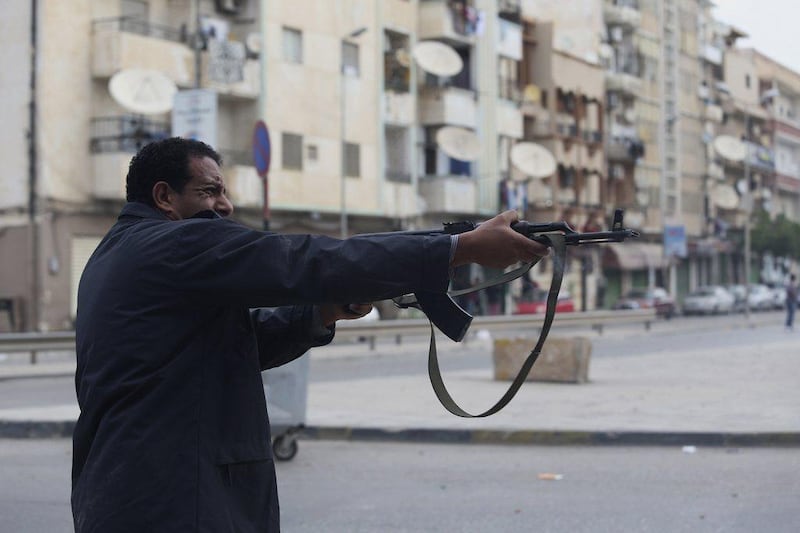TRIPOLI // Clashes involving soldiers, armed civilians and Islamist militants in Benghazi left nine dead yesterday, in the latest confrontation between residents and the militias.
The fighting started before dawn between armed citizens and members of Ansar Al Sharia, a group suspected to have been behind the September 11, 2012, attack on the US consulate in the eastern city, which left the US ambassador dead along with three other Americans.
Despite being officially banned, Ansar Al Sharia maintains a presence in Benghazi.
The violence prompted the army’s special forces to step in to quell the violence, said security officials.
Sounds of explosions and gunfire echoed across much of the city, but mainly in the Raas Obeida district and surrounding areas. Clouds of black smoke hung over Benghazi as ambulances rushed the wounded to hospital and pickup trucks with anti-aircraft guns mounted on their backs fired as they dash from one street to another.
Classes were suspended at the city’s schools and university, and most Benghazi residents stayed home because of the fighting. Mohammed Abu Sneina of Benghazi’s city council warned that harsh measures would be taken against anyone who disturbs peace and security.
As a relative calm gripped the city in the afternoon, a group of angry residents torched an office belonging to the Ansar Al Sharia.
The group emerged after the 2011 fall of Moamer Kadhafi’s regime, with its military wing composed of former rebel fighters.
Ansar Al Sharia, which demands implementation of Sharia as the only source of legislation, controls areas of Benghazi as well as Sirte and Derna, also in eastern Libya.
Libyan and foreign analysts say Islamist militants are responsible for much of the violence in eastern Libya but that the government has been loathe to take on the heavily armed groups for fear of reprisal.
Ansar Alm Sharia has said it does not recognise state institutions or its security forces, even as the government struggles to integrate former rebel fighters into a regular army and police force.
Libya has been roiled by unrest since the ousting in 2011 of longtime dictator Moammar Gadhafi. Armed groups that fought Gadhafi’s army in 2011 have turned themselves into militias that exploited the weakness of the weak central government in Tripoli and now control the streets and operate independently of the police and the military.
This month, at least 40 people were killed when residents of the capital, Tripoli, took to the streets to protest the presence of militias in the city. The uprising forced several militias to leave the city and head back to their hometowns.
The frustrations over the militias felt by many Libyans encouraged the government to start a major push to gain full control the country.
On Sunday, John Kerry, the US secretary of state, held talks in London with the Libyan prime minister Ali Zeidan and the British foreign minister, William Hague, to discuss the unrest in Libya.
Mr Kerry said the talks focused on how Washington and London can “help Libya to achieve the stability that it needs”.
* Associated Press with additional reporting by Agence France-Presse





